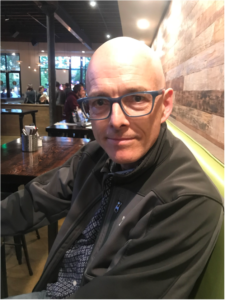An interview with Paul Cannon on Advocacy on October 3, 2023 by George Ackerman, Ph.D, J.D.

Biography
- Born in Guildford, England
- Education
- Secondary – Royal Grammar School, Guildford
- Undergraduate – Natural Sciences (MA), Christ’s College, Cambridge, England
- Graduate – PhD Medical Sciences, University of Calgary, Calgary, Alberta, Canada
- Post-doctoral – Lab of Gordon Ringold, Syntex, Palo Alto, California, USA
- Work history
- ~20 years in pharmaceutical R&D (including Neuroscience) as well as strategic roles (VP level) – Syntex, Roche and Genentech
- ~5 years as independent consultant – Tynan Consulting, LLC
- ~7 years running the Parkinson’s Disease research program at 23andMe – internal and external scientific champion as well as advocate for those living with and at risk of developing the disease & their care givers.
Please tell me a little about your background.
My Journey with Parkinson’s disease (PD)
- Formally diagnosed at 48 years old – once a neurologist saw me it was clear to them what I had even without any sort of resting tremor etc.
- Medical workup for carpel tunnel, cardiovascular and lung dysfunction delayed PD diagnosis by ~2 years
- “Obvious” symptoms at ~42 (one of my colleagues recognized that I had PD but thought that I wasn’t telling anyone!)
- In retrospect, an “odd” array of autonomic, sensory and other symptoms, e.g. constipation and sweating, profound loss of sense of smell (anosmia, w/o sig loss of sense of taste!) and small (slow?) handwriting
- No family history of formal PD and no known risk genes. A PRS (polygenic risk score) in my 23andMe PD report (no longer included) indicated an ~2x increased risk of PD.
- DBS surgery at 55 years old
Can you tell me more about your advocacy?
- I am emerging from going out on long term disability due to worsening PD symptoms and ongoing efforts to deal with social security disability.
- Trying to decide where best to put my efforts to maximize the benefit that I can hopefully have on the community.
What is your passion and how did you get involved in Parkinson’s awareness and hope for a cure?
- Strengthen the science deployed in the field of Parkinson’s disease research by enabling those who know the disease best, I.e., those living with or at risk of developing PD, to become true partners in the research effort.
- My view on a “cure” is that basically by the time that PD is diagnosed today 50-80% of the dopamine cells in the brain stem are toast or at best close to it and that PD as defined today is an end stage disease.
- PD appears to be increasingly common, more important than ever to understand the drivers, enable early detection and monitoring of progression, as well as developing lifestyle and therapeutic interventions that can prevent or at least slow progression.
What would you like to see as a future goal for your programs?
The good news is that there are several successful precedents in other areas, with the improvement in the prevention and treatment of heart disease over the last 75 years perhaps being the most impressive and encouraging.
What events do you participate in?
World Parkinson’s Congress
How can someone get in touch? What is your website?
paul.rpdc30@gmail.com
How can others also become advocates for awareness?
Read and don’t be afraid to ask questions
If you had one final statement or quote you could leave for the Parkinson’s community, what would it be?
Our aim should be to “Cure” PD by preventing it. Requires early detection and lifestyle and Rx interventions. Analogous to Heart disease the aim should be an integrated approach to brain health. Critical in an aging world.

